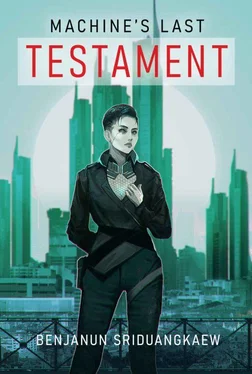Warden Hinata goes on, at length, how the potentiate quota might be lowered next month, doors will close, how could Ovuha, has she not been granted every opportunity, Hinata herself thought Ovuha would have a fine chance and Hinata had done so much for her—
They descend, out through the service corridor rather than the lobby: potentiates are to be handled with quiet efficiency, out of sight, in the way of waste disposal. She watches the Interior Defense units out of the corner of her eye. There is no doubt that, at the slightest act of non-compliance from her, they would shoot to kill. Her intelligence value would be little as far as anyone’s aware, since Doctor Dahaan is long dead. What he knew had already hemorrhaged out of him, arterial and comprehensive.
Dahaan Seong was not fully aware whose face it was he altered, else Ovuha would have already been lost, thrown into some tiny cell where her body is broken centimeter by centimeter and her neurological responses vivisected for the truth. Why he kept a record—a reconstruction—of what he’d done to her face she cannot imagine. Conceit, sentimentality. Both are surer killers than curiosity can ever be. Even so, Dahaan knew that his patient was powerful. Her retinue and combat harrier had been anonymous, the operation carried aboard a ship that bore no sigils or recognizable designs. Dahaan’s every breath and finger-twitch were monitored during the surgery. He’d objected at first that he did not have to operate in person, that he could perform it remotely. She had appealed to his artist’s pride.
She should have had him shot, whatever his claim of a dead man’s switch that would alert and incur the wrath of the Warlord of the Sparrow. In her grand pursuit, in the objective for which she’d come to Anatta, another death would have been nothing. And now all might be undone because she did not take care of that detail, did not tie that loose end.
They are heading to House Penumbra. Ovuha has not yet been evaluated as high-risk.
One of the first fields of study she made into Anatta was its interrogation tech. What drugs it uses, what signals its scans for, how much a subject can conceal. Contact between Anatta population and the exodus is prohibited, but not impossible. As long as there’s a human factor, any interdict can be perforated.
Decontamination. In a small dim room, she undresses. A cilia scrapes the inside of her mouth, probing at gums and teeth. Light moves across her torso, down her spine, between her legs. Tracing the shape of her, inside and out, the marrow and the gristle, the count of her ribs and the karyotype of her making. She imagines herself unseaming from the back, a long inky gash through which memories pour out in a salt-sand tide.
In the next chamber stands a rack of inmate smocks, shapeless and oversized. Mass-produced to make the human body contemptible, to begin the first step in which the self disarticulates. She’s often thought, in her time at the camps, of the resemblance between this and the training of soldiers. Both dismantle the social contract, destroy the apparatus of empathy and obligation, all that has been nurtured from infancy put on the chopping block. The end goal is the sole difference. A soldier learns to perform brutality; a prisoner learns to submit to it.
Somewhere during the decontamination she was injected with trance drugs. A higher dose than she’s ever gotten before, faster acting. The sensation of distance sets in, a barrier between consciousness and skin, her mind decoupling. Her steps slow and her mouth thickens, the edge of her vision singes, curling darkly.
She has awareness of being seated, hands on her, adjusting her posture and her head. A human interrogator then. Her consciousness hangs on by a thin tether, and even that flickers. During this time she is helpless; during this time anything can be done, so long as it does not leave a mark. In the camps it is nearly a given that something will be done when an inmate has not made the correct bribes, serving up other inmates like platters of meat. Some arrivals give up on bribery entirely—unable to afford, unequipped with the skills that’d let them curry favor. It is not as though you remember, they say, even if it does happen: might as well resign to it, at least it doesn’t bruise the flesh or break the bones. If rape must occur, and they are unanimous that it would, better to be sedated during. One can clean up and sanitize after, and it would be as though it’d never transpired. In the camps, Samsara’s admonishments are mere guidelines, not law.
Ovuha understands power, the limited amount that inmates build up among themselves, the bridges between the hungriest among them and the wardens whose momentary mercy can be bought. During her first stay, she exploited the links, integrated herself into the system of push and pull. The methodology of influence is the same everywhere, brute or otherwise, and in the camps it is mostly brute. In the Jasmine she might have allowed a child to beat her; in the camps she has no such luxury of weakness.
There is a hand on her chin, the side of her head. But not on her thigh or on her torso, to turn her onto her stomach or to part her legs. A veil falls over her, her mouth moves of its own volition. Where are you really from, what is your connection with Dahaan Seong, where were you born and what name were you given. What office did you hold, what is your intent and your plans, who gave you orders. She cannot hear the inquisitor’s voice—it scrapes, rusty metal in her ear—but the questions she can surmise. During trance the subject cannot refuse. Input, output—in that way, not unlike rudimentary machines. But the brain under this condition is simple, its parameters limited. Conditioning to circumvent the trance drugs was a matter of forcing selective amnesia. The version of the drug she obtained might have been an iteration or two behind, but it served. Years of preparing, experimenting until she could perfect the compartmentalization. The separated self.
She is conscious of embodiment again. A hard bunk beneath her, an empty ceiling above. She can move—motor control is fine—but the will to motion is a parched thing, her muscles leaden as though they’ve been cast in osmium. She lies prone, alone save for the panoptic gaze. Thought comes slowly, or not at all.
There is a window. Rhomboid, how strange, some architect’s whim. What it shows is white, one-dimensional, not the outside world but a wall. Penumbra is hermetic: she remembers that now.
The next twelve hours flatten out, dilated time. She is interrogated again, without drugs, a consistency check to cross-reference against what she said during her first questioning. By hour eleven she is in transit, the skin of her throat and nape briar-dark with paralytic restraints.
Her part of the car is shuttered; she does not get to see House Penumbra Zero-Seventeen dwindle into distance, smaller and smaller. One leaves the halfway house liberated by a caseworker, or returned to the camps. Or in a casket. Suicide is not easy when one is surveilled at all times, but the desire for exit is a formidable drive.
In her seat she cannot fidget or adjust her posture. An assistive has been strapped around her, in the event her bowels and bladder let go. One of the sharkish drones stands vigil at her shoulder. An odd choice, that Samsara is the only AI which can be represented with human form, a fully human visage. She wonders what other machines think of it, whether they chafe under this rule, the governance of the supreme AI. Samsara reigns over not one nation but two, though no doubt it builds its subjects for obedience. Humans of old imagined that machine intelligences could evolve—mutate—on their own, gain the apparatuses of curiosity, affection, identity. And they can, so long as they were composed for it, with the necessary parameters. Machine limit is a cold and precise element.
Читать дальше












